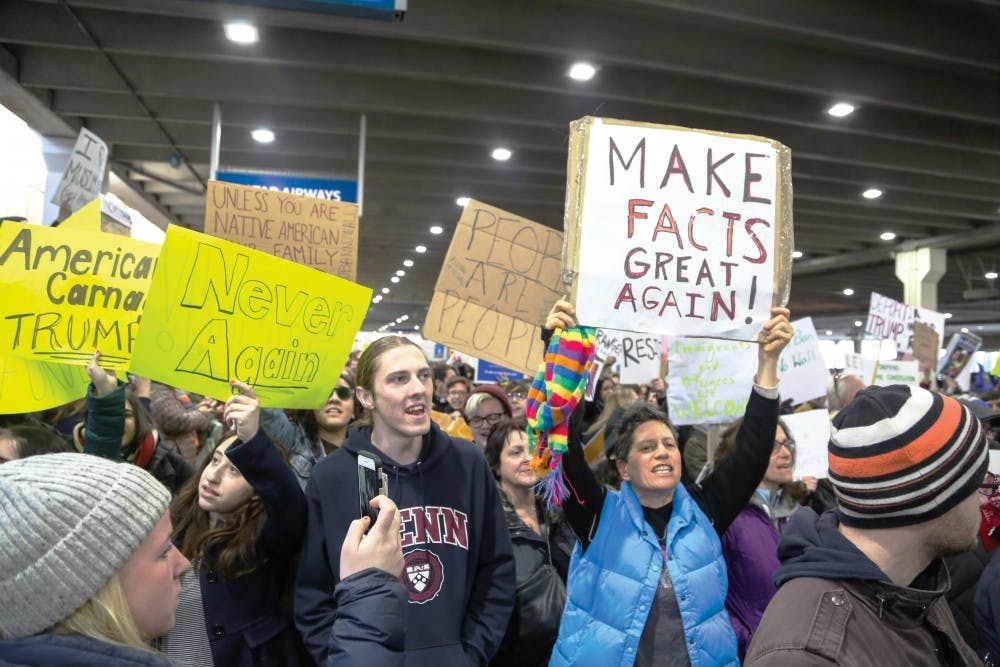In a decision that has wide-reaching effects on the Penn community, the United States Supreme Court upheld the third and latest iteration of the Trump administration’s travel ban on Dec. 4 — restricting most citizens of Iran, Libya, Chad, Yemen, Somalia, Syria, and North Korea, in addition to some from Venezuela, from entering the United States.
The move made the September edition of Trump's travel ban legal, paving the way for restrictions that, although different for each country, primarily will bar citizens of these countries from immigrating to and, in some cases, working, studying, or vacationing in, the United States.
On Penn's campus, some students fear that this travel ban gives license for people to discriminate against Muslim communities in the United States — other students said they still aren't sure what Penn administrators are doing to help.
University lawyers have previously told affected students not to leave the United States for fear that they may not be able to re-enter, Sudan citizen and College sophomore Aula Ali said.
Sudan was not added onto this edition of the travel ban, so although Ali is not directly affected, she has had experience with the University's support system for these students.
"The lawyers [International Student and Scholar Services] provided didn't really help at all," Ali said. She gave up an internship this summer in Sudan after a University lawyer told her to stay in the United States — a move she felt Penn was not prepared to support.
After reaching out again to Penn for help, Ali said the University was not sure what to do and did not provide housing accommodation for her over the summer. Executive Director for Education and Academic Planning Rob Nelson has previously said Penn was helping students on a "case-to-case" basis.
Ali was not sure if the University was still providing this service.
RELATED:
Under Trump’s latest travel ban, some Penn faculty worry they may never see their families again
This report has found that there are fewer new international students coming to U.S. colleges
"At first ISSS provided pro bono legal advice to all students affected, but I don't see that happening anymore," she said.
University spokesperson Stephen MacCarthy did not respond to inquiry into Penn's response to the most recent travel ban.
Officials have stated that the restrictions will not impact anyone who already holds a U.S. visa — however, if a student's visa expired before the student completed studies it would be difficult to renew. Additionally, the ban prevents some of these students' families from entering the United States to visit.
Yahoo Finance also reported that the ban primarily impacts students from Iran — who will face increased vetting but not have valid student visas suspended — and from North Korea and Syria — whose entry is completely suspended.
The latest decision elicited harsh criticism from student groups with members affected by the decision, as opponents questioned the rationale behind the restrictions and the negative effects it will have on Penn students.
"It's important to understand the breadth and depth of the effects of this ban," said College and Wharton junior Zuhaib Badami, who is the former president of the Muslim Students' Association. "It gives license to discriminate against Muslim communities as a whole."
Other students agreed that the policies continued to target and greatly impact Muslim communities.
“This decision is really disappointing and saddening,” President of the Penn Arab Student Society and Engineering junior Nayef Yassin said. “The Trump administration say they are countering terrorism, when in reality all they are doing is being truly xenophobic and targeting Muslim countries to fearmonger in the United States.”
President of Penn Democrats and College junior Rachel Pomerantz also said the travel ban is a flawed policy, saying that "at its core, this is still a Muslim ban."
From conversations with others affected, Badami said that their primary concern seems to be the inability to travel back and forth to visit family or to hold international internships.
"It represents a financial and career burden," Badami said. "Many [students] have internships planned abroad and those opportunities are now out the window."
For now, Yassin urged those affected to listen to advice from ISSS and to remain resolute in the face of adversity.
"We know this is emotionally and mentally daunting,” Yassin said of the advice he would give to any student directly affected by this ban. “But we are all one community and we are here for support.”



